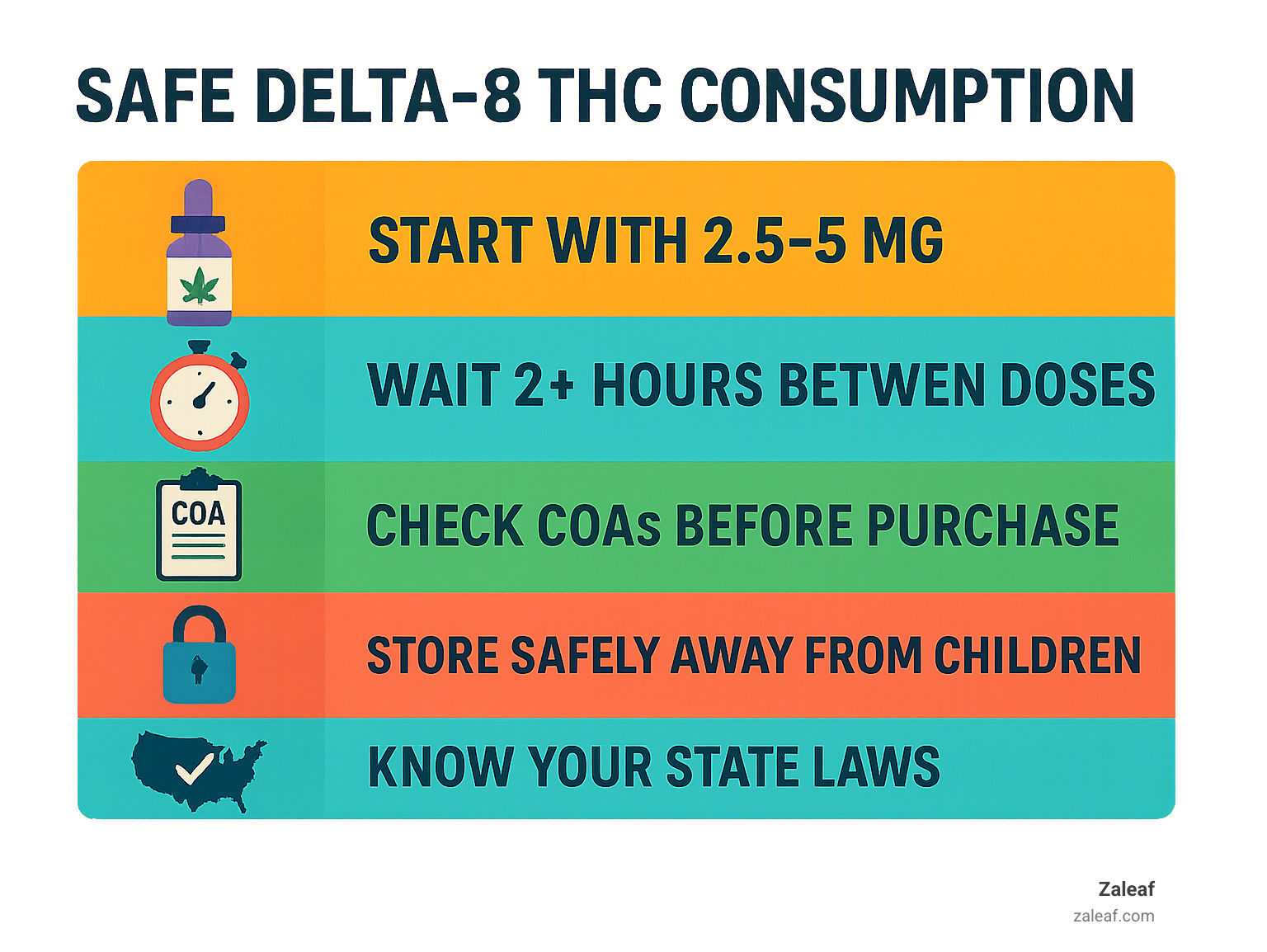Delta-8 THC in CBD Products: How Much Is Too Much?

Understanding Delta-8 THC Limits in CBD Products
How much delta-8 THC can a CBD product contain depends on where you live and how the product is made. Here's what you need to know:
Federal Level (United States): - No specific limit for delta-8 THC content - Must contain less than 0.3% delta-9 THC (dry weight) - DEA considers synthetically derived delta-8 as Schedule I
State Level: - 9 states have banned delta-8 THC entirely - 41 states allow hemp-derived delta-8 products - Some states set their own THC limits
International: - Canada: 10 mg total THC per edible package - EU: Delta-8 classified as novel food (restricted)
The lack of federal limits on delta-8 THC has created a legal gray area. While hemp products must stay under 0.3% delta-9 THC, there's no cap on delta-8 content. This means some CBD products contain significant amounts of delta-8 - sometimes up to 30% or more.
Most delta-8 THC in products doesn't occur naturally. Hemp plants contain less than 0.1% delta-8 naturally, so manufacturers convert CBD into delta-8 through chemical processes. This conversion can create up to 30 unidentified byproducts, raising safety concerns.
I'm Max Shemesh from Zaleaf, and I've spent years navigating the complex regulations around how much delta-8 THC can a CBD product contain while building partnerships with over 300 retail locations nationwide.
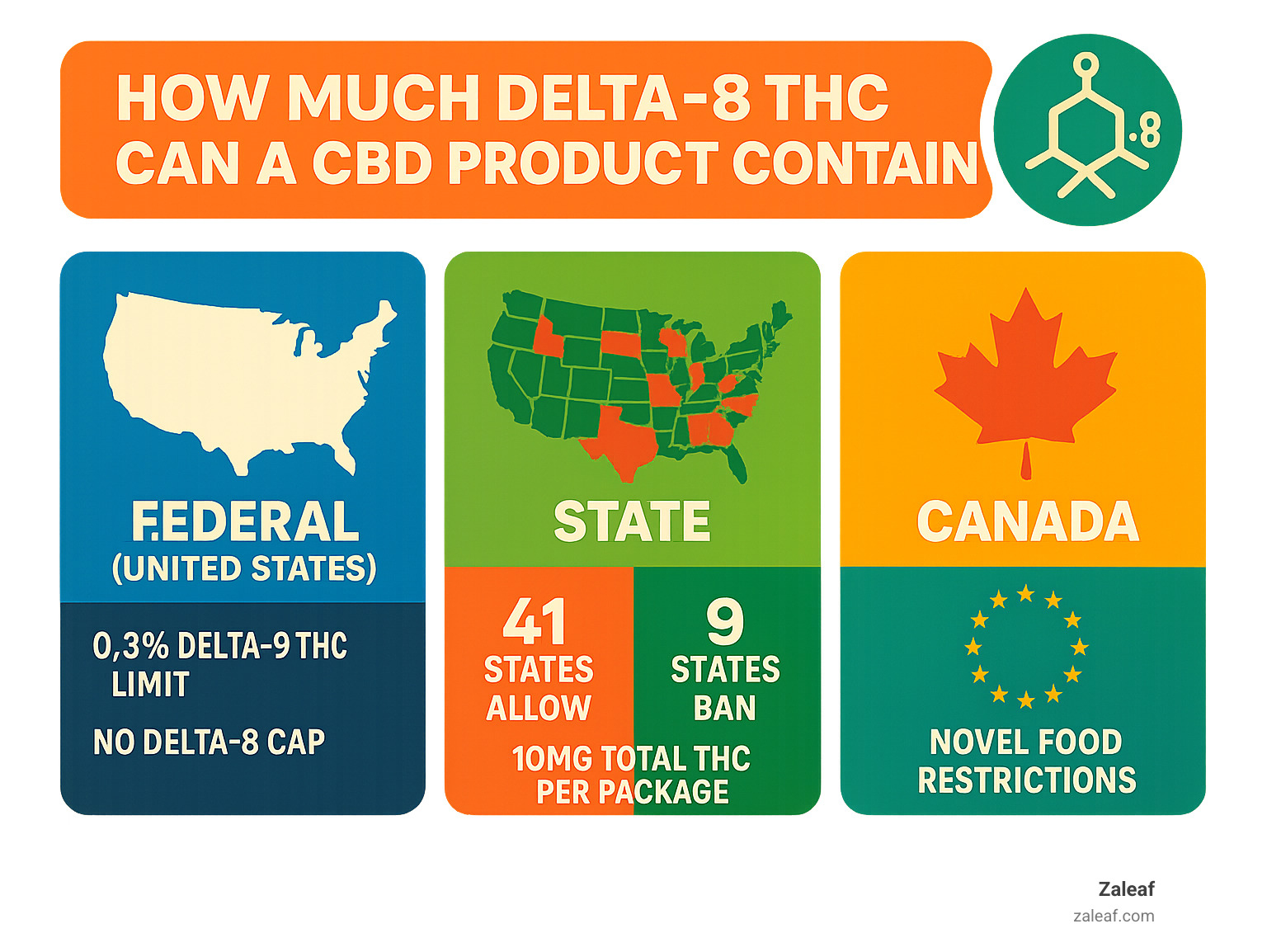
How much delta-8 thc can a cbd product contain terminology: - cbd delta 8 products - delta 8 legal status - does delta 8 have thc
What Is Delta-8 THC and Why Does It Show Up in CBD Products?
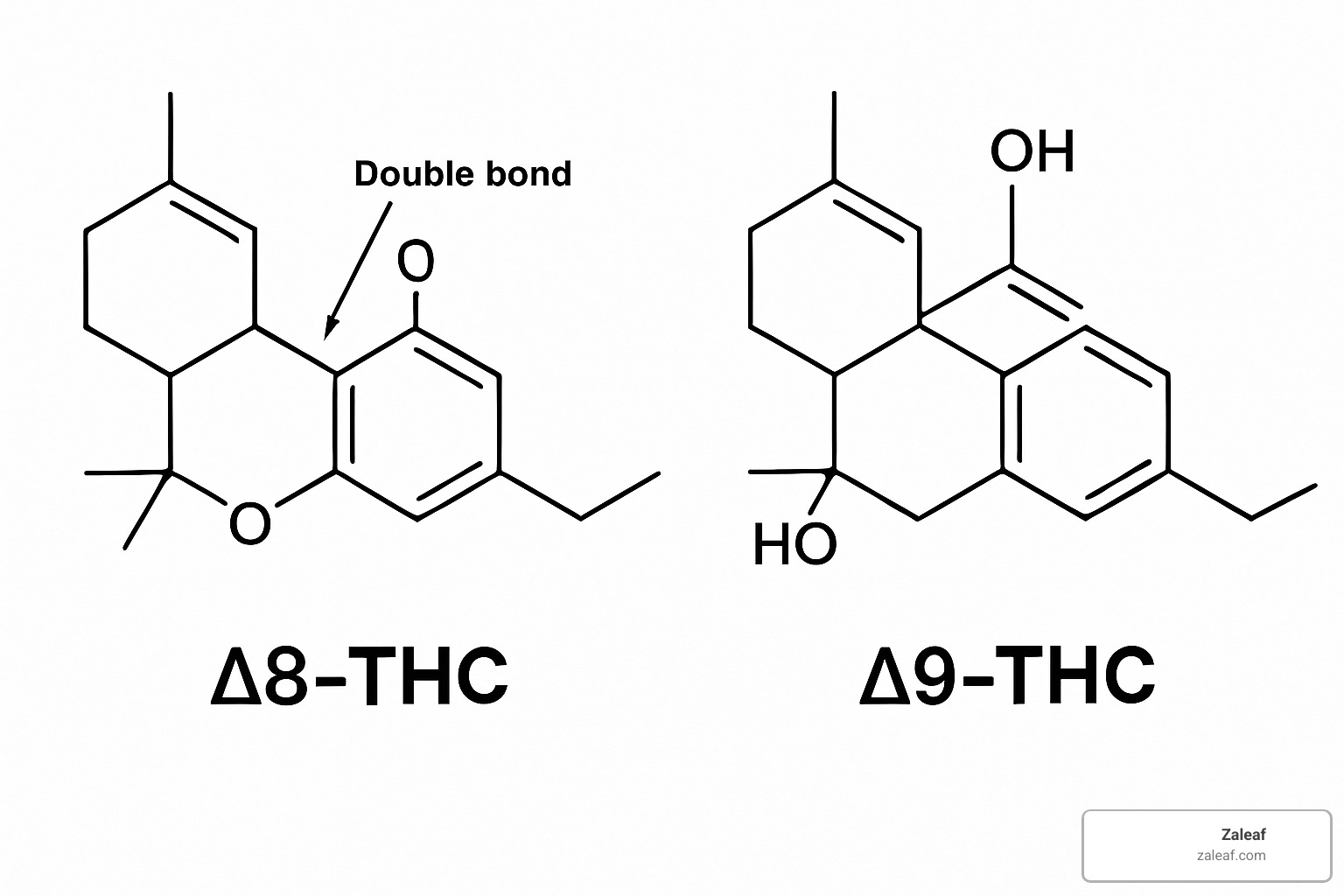
Delta-8 THC is delta-9 THC's gentler cousin - they're nearly identical with one tiny but important difference. Delta-8 THC has its double bond in a slightly different spot on the molecular chain, making it about 50-75% less potent than regular delta-9 THC.
Delta-8 THC keeps showing up in CBD products for two main reasons:
Natural vs. Converted Delta-8
Hemp naturally contains less than 0.1% delta-8 THC - barely a trace amount. This tiny natural amount isn't enough to create commercial delta-8 products. Instead, most comes from acid-catalyzed CBD isomerization - manufacturers chemically convert CBD into delta-8 THC.
The process involves treating CBD with acids like p-toluenesulfonic acid in solvents for 60-90 minutes. The catch: this conversion creates numerous byproducts that scientists are still trying to identify.
Recent testing reveals that converted delta-8 products often contain delta-9 THC, delta-10 THC, olivetol, and up to 30 unidentified compounds. As one analytical chemist put it, "Consumers are being used as guinea pigs."
Commercial Production Pathways
After the 2018 Farm Bill legalized hemp, the market became flooded with CBD isolate. Manufacturers realized they could transform this excess CBD into delta-8 THC through chemical processes, creating products in a legal gray area.
The typical pathway involves isomerization reactors where CBD undergoes chemical conversion, followed by purification challenges to remove unwanted compounds. The final step involves diluting the concentrated delta-8 distillate with carrier oils.
This is why third-party testing becomes crucial when asking how much delta-8 THC can a CBD product contain. At Zaleaf, transparency isn't just nice to have - it's essential for your safety.
Many CBD products now contain delta-8 THC either intentionally or unintentionally as a byproduct of processing. Understanding this helps explain why some CBD users report unexpected effects or positive drug tests.
How Much Delta-8 THC Can a CBD Product Contain Under Current Laws?
The legal landscape for how much delta-8 THC can a CBD product contain varies wildly depending on where you live.
| Jurisdiction | Delta-8 THC Limit | Delta-9 THC Limit | Notes |
|---|---|---|---|
| US Federal | No specific limit | 0.3% (dry weight) | DEA considers synthetic delta-8 Schedule I |
| US States (41) | Varies by state | 0.3% (dry weight) | Some states have additional restrictions |
| US States (9) | Banned entirely | 0.3% (dry weight) | Alaska, Arizona, Arkansas, Colorado, Delaware, Idaho, Iowa, Mississippi, Montana |
| Canada | 10 mg total THC per package | 0.3% | Applies to all THC isomers combined |
| European Union | Novel food restrictions | 0.2% | Delta-8 requires pre-market authorization |
There's currently no federal limit on delta-8 THC content in hemp products. The 2018 Farm Bill only restricts delta-9 THC to 0.3% by dry weight, creating a "gray area loophole" where products can contain substantial amounts of delta-8.
The DEA has stated that synthetically made delta-8 THC is still a Schedule I controlled substance. Since most commercial delta-8 comes from converting CBD rather than extracting it directly from plants, this creates legal uncertainty.
The CDC has issued health alerts about delta-8 due to increasing reports of concerning side effects.
How much delta-8 THC can a CBD product contain in the United States?
Federally, there's no specific limit on delta-8 THC content. This has led to products containing 30% or more delta-8 THC - levels that would definitely get you high.
Nine states have banned delta-8 THC entirely: Alaska, Arizona, Arkansas, Colorado, Delaware, Idaho, Iowa, Mississippi, and Montana. In these states, the answer is zero.
The remaining 41 states allow delta-8 products, but many have their own rules. California requires that all THC variants combined stay under 0.3%.
How much delta-8 THC can a CBD product contain in Canada and abroad?
Canada takes a clearer approach. Health Canada limits edible cannabis products to 10 mg of total THC per package, including all THC variants combined.
The European Union has classified delta-8 THC as a "novel food," requiring pre-market safety authorization before being sold to consumers.
At Zaleaf, we stay on top of these changing regulations to ensure our products meet legal requirements wherever they're sold.
Risks, Benefits and Safety of Delta-8 in CBD Formulas
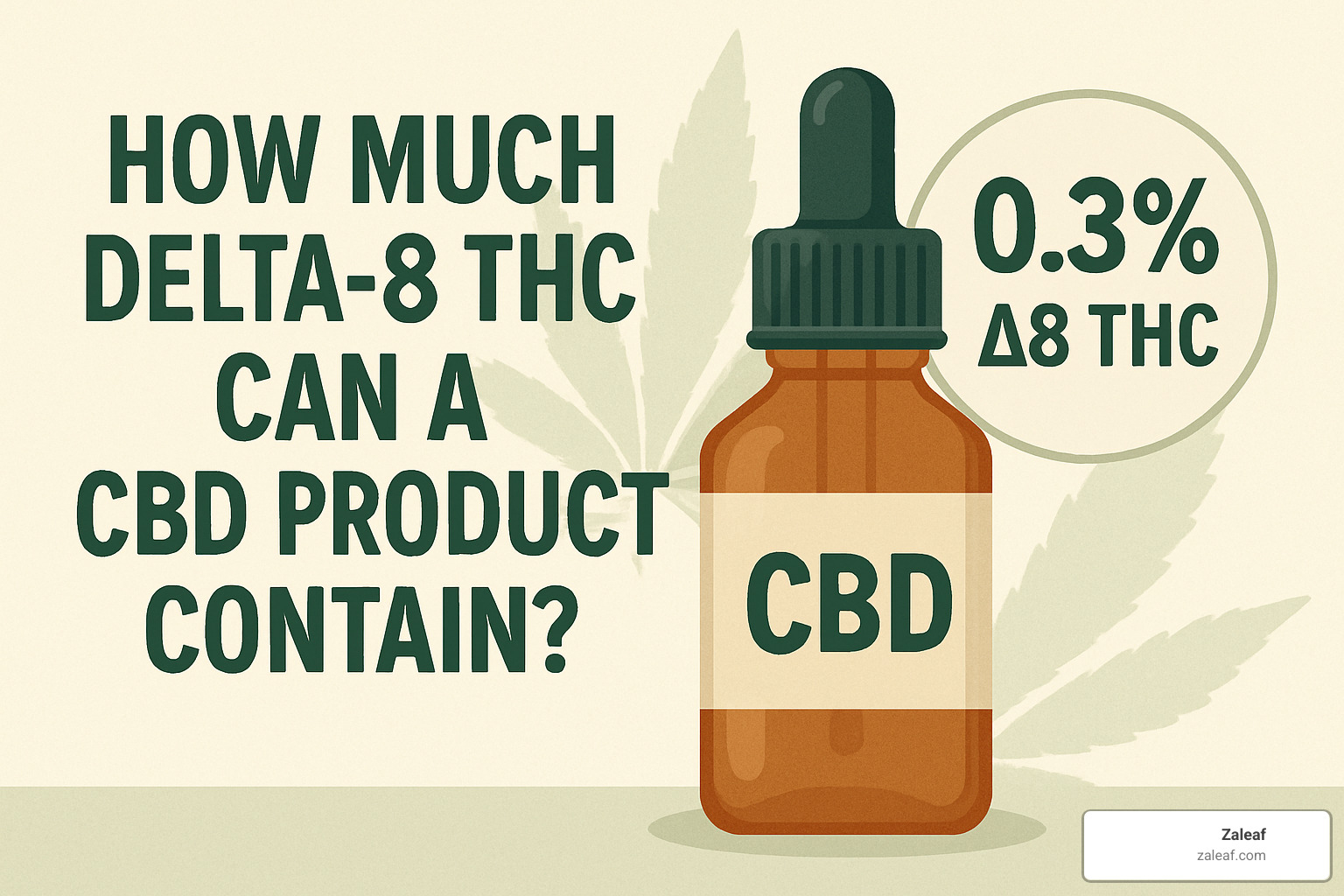
Delta-8 THC produces psychoactive effects that are roughly 50-70% as potent as delta-9 THC. Many users describe the experience as more clear-headed and less anxious. Some report potential benefits like mild pain relief and reduced anxiety, though these haven't been extensively studied.
Between December 2020 and February 2022, the FDA received 104 adverse event reports involving delta-8 THC products.
Health Effects & Side Effects
The most troubling aspect isn't just the direct effects - it's what we don't know about the products themselves. The conversion process can leave behind residual acids, heavy metals like lead and mercury, and up to 30 unidentified compounds.
Common side effects include euphoria and dizziness, but also more concerning symptoms like hallucinations, vomiting, tremor, and loss of consciousness. Some users experience cannabinoid hyperemesis syndrome - severe nausea and vomiting that can require emergency treatment.
Pediatric exposure data is particularly alarming. U.S. poison control centers received 2,362 exposure cases involving delta-8 THC products between January 2021 and February 2022, with 41% involving children under 18.
Delta-8 can interact with medications, particularly those affecting the central nervous system. Consult your healthcare provider before using any products containing delta-8 THC.
Drug Testing & Detection
Delta-8 THC can absolutely make you fail a drug test. Most workplace screenings can't distinguish between delta-8 and delta-9 THC metabolites. Both produce similar breakdown products, including 11-nor-delta-8-THC-COOH, which shows up on standard urine tests.
A recent study found that 378 out of 1,504 urine specimens contained detectable delta-8 metabolites. The detection window can last from days to weeks, depending on usage frequency.
The FDA has issued consumer updates on delta-8 warning about safety concerns and lack of quality control.
At Zaleaf, we provide detailed lab reports so you know exactly what you're getting. Understanding how much delta-8 THC can a CBD product contain helps you make informed decisions.
How to Know the Delta-8 THC Level in Your CBD Product
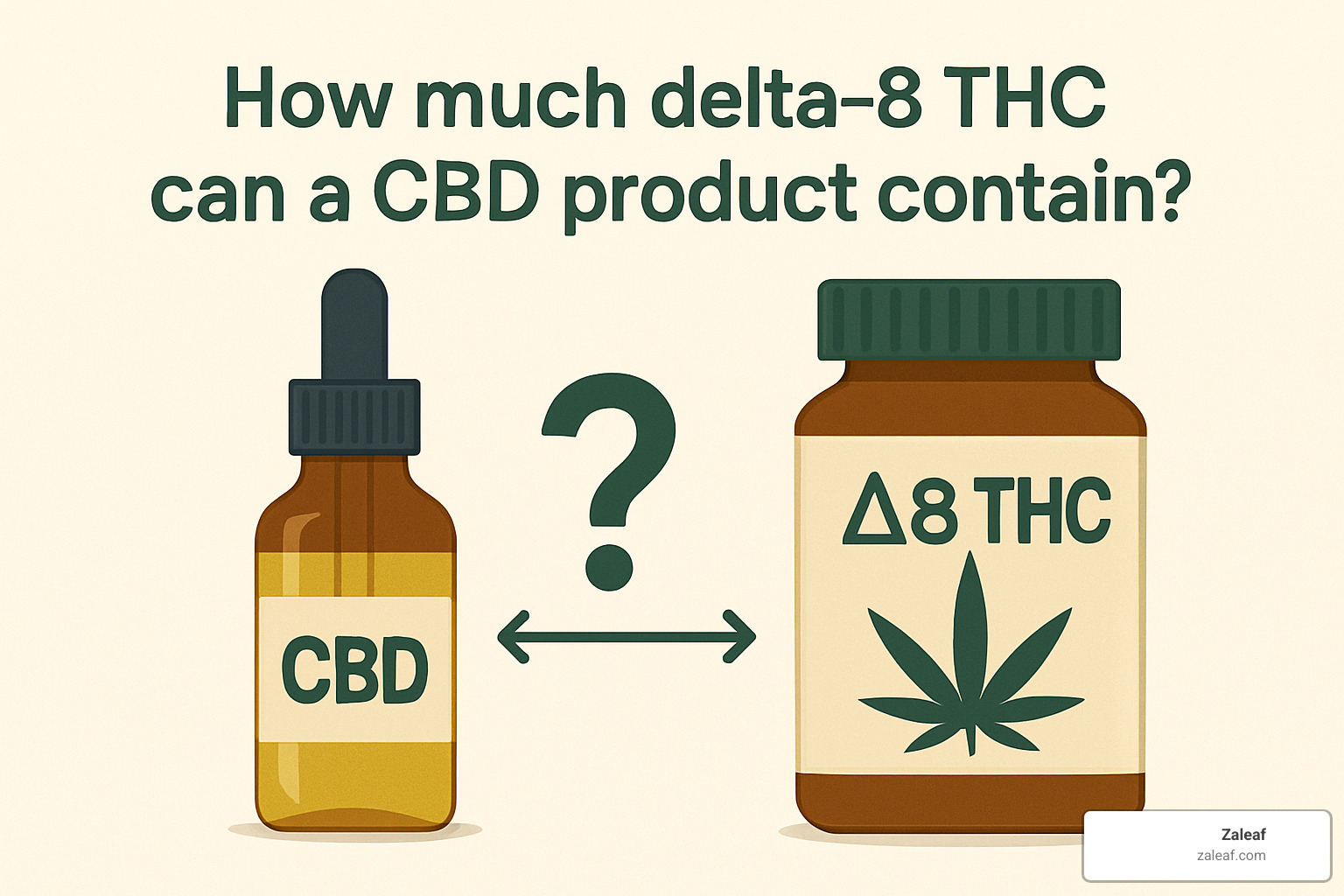
Finding out how much delta-8 THC can a CBD product contain in your specific product shouldn't feel like solving a mystery. Some CBD products contain zero delta-8 THC, while others might surprise you with significant amounts.
Reading the Label & COA
A Certificate of Analysis (COA) is your product's report card. Every trustworthy CBD company provides these detailed lab reports.
Your COA shows the cannabinoid profile with exact amounts of CBD, delta-8 THC, delta-9 THC, CBG, CBN, and other compounds. Pay attention to potency per serving versus total potency in the entire package.
The testing date matters - cannabinoids can degrade over time. Check that the batch number on your product matches the COA.
Ensure testing was done by an independent, accredited laboratory. Companies that test their own products aren't exactly reliable.
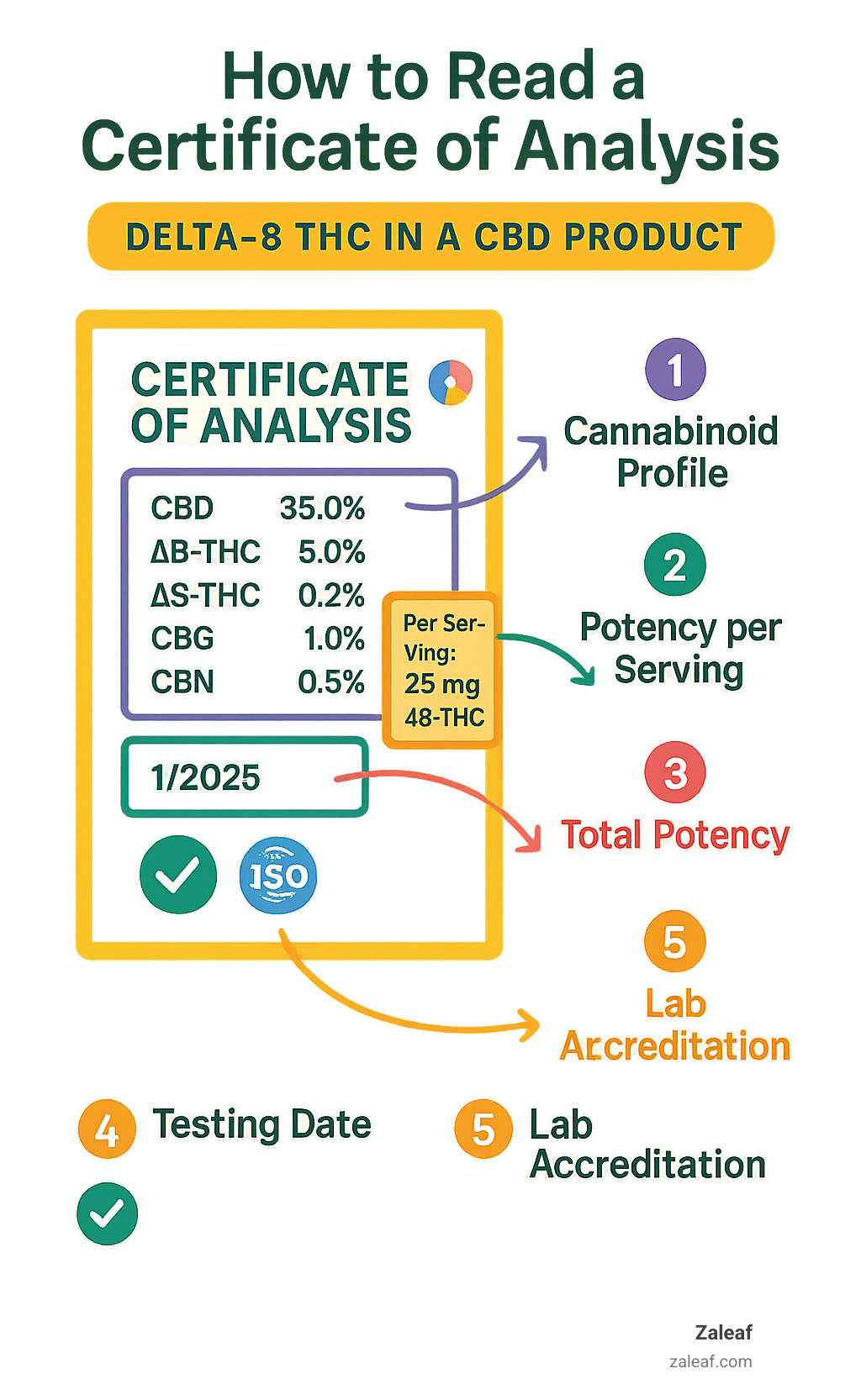
At Zaleaf, we put QR codes right on our packaging. Scan it with your phone to see the exact COA for your specific batch.
DIY Screening: Red Flags
No lab report available is the biggest red flag. If a company won't show you what's in their product, assume there's a reason.
Watch for vague "hemp extract" labeling without specific amounts and unusually low prices that often signal corner-cutting.
Products claiming to be "100% natural" delta-8 should raise eyebrows. Most delta-8 THC is created through chemical conversion, not direct plant extraction.
Trust companies with clear COAs from accredited labs, specific cannabinoid amounts on labels, and proper child-resistant packaging.
When determining how much delta-8 THC can a CBD product contain, the answer should always be readily available through proper documentation.
Smart Consumer Tips: Using and Storing CBD + Delta-8 Products Responsibly
Start low and go slow is the golden rule. Begin with 2.5 to 5 mg of delta-8 THC, especially if you're new to cannabis products. Effects can take up to two hours with edibles. Keep a journal noting dosage and effects to find your sweet spot.
Storage matters. Keep products in original packaging with batch numbers visible. Store in a cool, dry place away from direct sunlight. Heat and humidity can break down cannabinoids.
Child-proof storage isn't optional - it's essential. Many delta-8 products look like regular candy, making them attractive to kids and pets. Statistics on pediatric exposures are sobering.
Never drive or operate machinery after using delta-8 THC products. Even though less potent than delta-9 THC, it can impair reflexes and judgment for 4 to 8 hours or longer.
If you take prescription medications, consult your healthcare provider before adding delta-8 products to your routine.
What to Do If You Feel Adverse Effects
If you're feeling uncomfortable after taking a CBD product with delta-8 THC, cannabis cannot cause a fatal overdose. You might feel anxious, dizzy, or "too high," but these feelings will pass.
Stay calm and hydrate. Find a comfortable, quiet space and sip water. Deep breathing helps manage anxiety. Having a trusted friend nearby when trying new products is smart.
When to seek medical help: If you experience severe symptoms like persistent vomiting, extreme confusion, or difficulty breathing, call 911 or visit an emergency room.
Document everything if you have an adverse reaction. Keep product packaging, note the batch number, and write down symptoms and timing.
Report adverse events to the FDA using their electronic Voluntary MedWatch form. Your report helps protect other consumers.
For accidental ingestion by children or pets, contact poison control immediately at 1-800-222-1222.
At Zaleaf, all our products come with detailed lab reports and clear dosing guidelines - because your safety matters most.
Frequently Asked Questions about Delta-8 THC in CBD Products
Is delta-8 THC legal everywhere if it comes from hemp?
No, delta-8 THC isn't legal everywhere, even when it comes from hemp. The 2018 Farm Bill legalized hemp products containing less than 0.3% delta-9 THC but didn't specifically mention delta-8 THC, creating a gray area.
Nine states have banned delta-8 THC regardless of source: Alaska, Arizona, Arkansas, Colorado, Delaware, Idaho, Iowa, Mississippi, and Montana.
The DEA states that synthetically derived delta-8 THC remains a Schedule I controlled substance. Since most commercial delta-8 is made by converting CBD through chemical processes, this creates legal uncertainty.
Always check your local and state laws before purchasing delta-8 products.
Will delta-8 in my CBD tincture make me fail a drug test?
Yes - delta-8 THC can absolutely cause you to fail a standard drug test. When you consume delta-8 THC, it breaks down into metabolites nearly identical to those produced by delta-9 THC. The main one is 11-nor-delta-8-THC-COOH, and most workplace drug tests can't tell the difference.
These metabolites can stick around for days to weeks after use, depending on usage frequency, metabolism, and body composition.
If you're subject to drug testing, avoid any products containing delta-8 THC entirely. Even small amounts can potentially trigger a positive result.
How can I tell if a CBD gummy's delta-8 level is within safe limits?
Since there's no federally established "safe limit," you'll need to do detective work.
Start with the Certificate of Analysis (COA). This should clearly show the exact amount of delta-8 THC per gummy and for the entire package.
For beginners, look for products with 2.5-5 mg of delta-8 THC per serving. This provides gentle introduction without overwhelming effects.
Red flags include products without COAs, vague labeling like "hemp extract" without specific amounts, or unusually potent products for the price.
Pay attention to serving size versus total package content. A package with 100 mg total delta-8 THC divided into 20 gummies equals 5 mg per piece - reasonable for most people.
The golden rule? Start low and go slow. Begin with half a gummy, wait at least two hours, then decide if you need more.
Conclusion
Navigating how much delta-8 THC can a CBD product contain doesn't have to feel overwhelming. The regulatory landscape might seem complex, but the path forward is clear: prioritize quality, stay informed about local laws, and always verify what you're buying through third-party testing.
Here's what matters: Most delta-8 THC is created in labs, not grown in fields. While federal law sets no specific limits on delta-8 content, that 0.3% delta-9 THC rule still applies. Nine states have banned delta-8 entirely, while others welcome it. Your CBD gummy could legally contain significant amounts of delta-8 THC alongside up to 30 mystery compounds from the conversion process.
The drug testing reality is important - delta-8 THC will show up on standard workplace drug tests. Plan accordingly if testing is part of your job.
Quality makes all the difference in this largely unregulated space. At Zaleaf, we believe you shouldn't have to guess what's in your products. That's why we put every product through comprehensive third-party testing and make those results easy to find.
We've spent years perfecting our cannabinoid and terpene profiles to create specific mood effects while staying compliant with regulations. Our lab testing page breaks down exactly how we verify every batch.
The bottom line? Education and caution are your best friends in the delta-8 world. Start low, go slow, check those COAs, and know your state's rules. We make it simple by shipping fully tested, compliant products right to your door - no ID required, no medical card needed, just pure transparency and quality you can trust.
